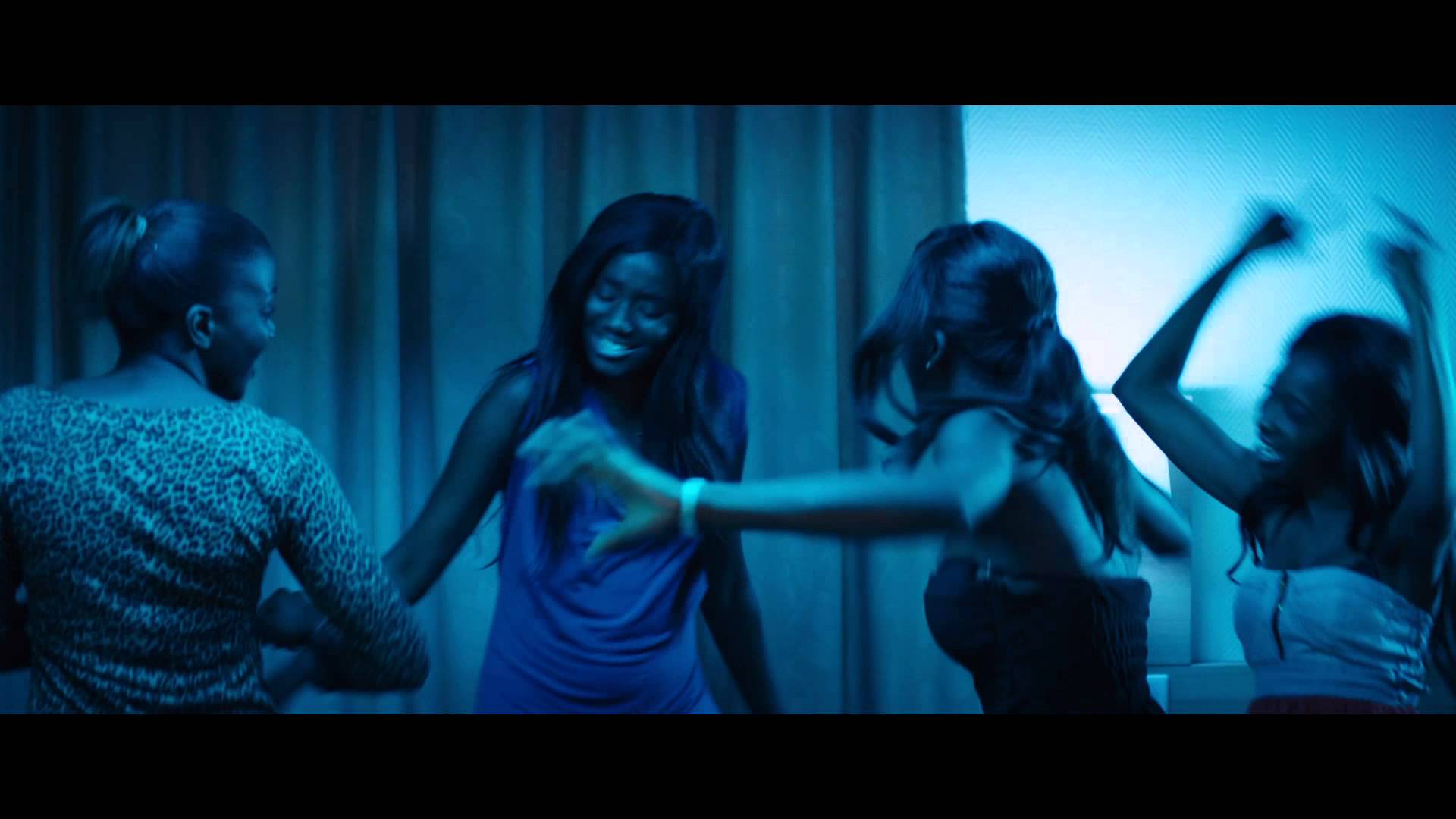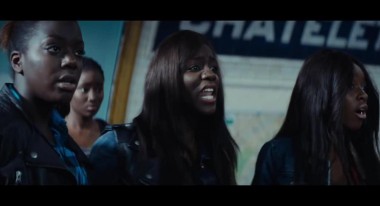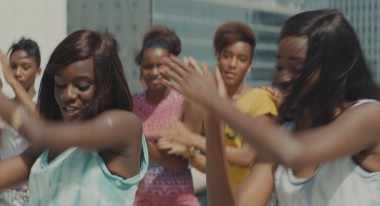 Back to selection
Back to selection
Pussy Riot: Celiné Sciamma’s Girlhood
 Karidja Toure (facing camera)
Karidja Toure (facing camera) We’re beautiful/Like diamonds in the sky. Clad in ripped-off-the-rack evening dresses with anti-theft devices intact, four teens who form a tight clique — semi-tough, to borrow from the Michael Ritchie/Burt Reynolds satire — lip-synch and boogie down to the assertive voice of Rihanna. Celebrating their frequently downplayed femininity, they spiritedly defuse in a hotel room rented for one special night, recharging from the heavy-attitude posturing and word- and fist-fights with newly cast rivals that interrupt their day-to-day aimlessness.
Their loyal, affectionate companionship counters the ennui and male dominance entrenched in the world of charmless concrete projects that is Le Clos-Francais, their turf in one of the numerous banlieues far outside Pais in every way. “Group of Girlfriends” is a fairly accurate translation of the film’s French title, Bande de filles; Girlhood tames director and ardent feminist Céline Sciamma’s self-described “fictional manifesto” for a xenophobic anglophone audience, and confuses a highly original, specialized work with Richard Linklater’s poignant Boyhood, which is more universal and ultimately more benign.
Everyday these four daughters of impoverished immigrants from sub-Saharan Africa confront a highly stratified order in which they perch on one of the lowest rungs. They unapologetically engage in rebellious verbiage and unsanctioned behavior in an effort to maintain some pride in a stifling milieu. The fact that they have little to talk about outside their narrow circle indicts a status quo that mocks the tripartite motto liberté, egalité, fraternité, a system in which higher education is more a privilege than an entitlement. (The French are neither citizens nor subjects: they are stuck somewhere in between.) In a powerful scene inside a cheap clothing store, leader-of-the-pack Lady (Assa Sylla, a stunner who might have been created for the camera) shrieks “shop slave!” at the unsubtle white salesgirl who has been stalking one of her own. The cri de coeur is a challenge to the master from a servant fully aware of possible consequences at the hands of the despised flics.
Like the all-female musical sensation whose name I have ripped off to entitle this review —but without the skin color, schooling, and connections that afford the outspoken Russians access to international media and a worldwide following — the young black women are performers as well as by-default social commentators. They recognize and vilify oppression of a different sort, even if on a smaller scale.

For the most part, they set their own boundaries, blurring the line between outrage and creativity. They break into song and dance whenever the mood strikes, anywhere, anytime. They are constantly on. They dish passersby in a mall for the crime of out-of-fashion couture with a dated sarcasm that could be out of Boys in the Band (“Leggings are so 2008!”); and they harass their “sisters,” unprompted, in cheap snack bars (“You think you’re hot stuff?”) solely to keep themselves entertained.
Performance abounds beyond the central cluster. A marvelous tracking shot sweeps slowly across a seemingly endless chorus line of their peers. The scene erupts. Reps from assorted bandes take turns strutting their stuff in the foreground. To unanimous applause, a participant cries out to the dancing fools at her side, “Strike a pose!” Ironically, the high-energy display of female bravura takes place in front of la Grande Arche de la Defense, a heavy, graceless monument that bears little relevance to residents of their fringe suburbs. Toward the end of a riveting, assaultive opening sequence, heavily padded football players remove their helmets to reveal female ‘dos. Even more shockingly, the athletes on each team high-five their opponents after the game; men just don’t do it. Sciamma scores points up front for a narrative varnished with women’s strength and confidence — hardly a surprise from the maker of Water Lilies and Tomboy. Like her characters, she thrives on exclusivity.
The plot goes into gear. A throng of buzzing schoolgirls heads back to the projects until the appearance of some male slackers their age intimidates them into shutting down. Among them is 16-year-old Marieme (Karidja Touré, whose beautiful face, in the service of Sciamma’s evolving storyline, registers blank in radically diverse situations), coiffed in the long braids of innocence. She is devoted to her family: a nearly absent mother who cleans offices at night, two younger sisters she tends to, and even an abusive, self-righteous older brother, Djibril (Cyril Mendy), presumably the “man of the house” (there is no mention of a father). Once she splits from the group, the camera follows her past current crush and future boyfriend Ismail (Idrissa Diabaté) — the only good guy in Girlhood — whose friendship with Djibril makes public acknowledgement of their relationship impossible. She becomes the principal protagonist in an extraordinary cinematic essay on coming of age within a strictly confined subculture.
A cold off-camera counselor rejects her passionate plea for permission to attend high school in lieu of vocational training, admonishing her with, “It’s too late for (normalcy).” Deflated, she exits directly into the clutches of a fierce threesome that includes Lady, manic clown Adiatou (Lindsay Karamoh), and casual, knife-wielding Fily (Mariétou Touré). Reservedly opportunistic, she replaces a departed pal-turned-responsible mother and is rechristened “Vic” (for “victory”) by Lady, who becomes her mentor. While taking a bubble bath during the all-night hotel party, Lady assures the visibly frightened girl when a cell-phone ring signals yet another call from the overprotective Djibril. “You can do whatever you want!” she says firmly. The disconnection proves louder than any conversation.

Marieme learns to adopt new personas as easily as hair styles and signifying outfits in the distinct acts of this formally rigorous film. A prolonged black screen accompanied by catchy, repetitive keyboard chords bridges the metamorphoses. She is a chameleon, a lost young woman whose sense of identity and self-regard is scant, except when circumstances necessitate attaching herself to others, or the opposite: refuting them. By the second act, her hair is straight. Jeans, black leather jacket, and an untucked shirt have replaced her skirts. Her gait is mannish and off-putting by design, practical for squeezing money from helpless girls outside the school she had been barred from. Again and again, Sciamma addresses the schizoid nature of belonging to a girly gang: the alternation of egregious actions echoing the worst of machismo with full immersion in an anachronistic feminine ideal. Lady oozes sexual magnetism, but also plunges into a ferocious match where the winner triumphantly snips off the bra of the humiliated loser. West Side Story is lame in comparison: It lacks the natural choreography of Girlhood’s violence and rhythmic movements. (Both films do, however, opt for miming. Sorry, Natalie.)
Marieme appropriates the model. No matter which direction she turns, though, a pattern of powerful males narrowing her choices persists, save for Ismail. She accepts protection from fast-talking Abou (Djibril Gyeue), the underground “boss” of a multiple communities. She assumes the role of the classic tomboy while vending on the street at night, then has to make herself over to play a blonde-bewigged babe in a chic red dress when dealing for him at cocktail parties in the homes of the white moneyed class. Is integration of the two modi operandi an option?
Like the togetherness and good fit on display when the four girls bounce around at their private affair — Marieme later recalls the evening as “the perfect moment” — collaboration is deeply rooted in the filmmaker’s process. The enterprise is a productive partnership; Sciamma, the Lady of the bande. She worked closely with the four leads, all non-professionals, allowing them to improvise before locking their characters into a fixed scenario. Cinematographer Crystel Fournier’s images of groups of girls either crammed together or isolated from their surroundings fulfill the original promise of CinemaScope. Composer Jean-Baptiste de Laubier’s score is excellent, as is the music of Para One, one of many fine groups heard on the soundtrack. After reading the screenplay, by the way, Rihanna gave the project a thumbs up and Sciamma the rights to “Diamonds” — perhaps Girlhood’s best friend.
